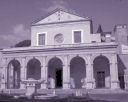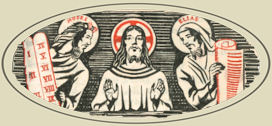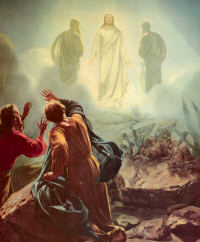» Enjoy our Liturgical Seasons series of e-books!
Between Moses and Elias Jesus shows forth His divine glory, thus foreshadowing His resurrection. He is the Alpha and the Omega, the beginning and the end of all things. Today's Mass places before us the transfigured Lord and the model toward Whom we must tend, and our own transfiguration as the goal we must attain. We attain this goal by a profound realization of our sinfulness and need of a Redeemer; by preserving purity of body and soul; by combating our passions and carnal instincts and observing the commandments and most importantly by participating in the Mass. — Excerpted from Cathedral Daily Missal
Click here for commentary on the readings in the Extraordinary Form of the Roman Rite.
Sunday Readings
The first reading is taken from the book of Genesis 12:1-4. In due time God began the remote preparation for the Incarnation. Almost 2,000 years before Christ was to come he selected Abram to be the father of a people who would be his special friends, his "Chosen People," and through them, the fullness of his revelation. Christ, would come to all men. This is the divine event read for us today.
The second reading is from the letter of St. Paul to Timothy 2 Tim 1:8-10. Timothy, son a pagan father and a Jewish mother, became a Christian, together with his mother Eunice and his grandmother Lois, on his first visit to Lystra. Later, Paul appointed him head of the church at Ephesus. This epistle is principally concerned with the pastoral duties of pastors or shepherds of the communities.
The Gospel is from St. Matthew 17:1-9. This momentary vision of Christ, in his glory, was given in order to strengthen the three principal Apostles to face the trials to their faith, which the sufferings and crucifixion of their beloved master would bring on them. For the very same reason it is retold to us today, in the early part of Lent, to encourage us to persevere in our Lenten mortification. It reminds us that, very soon, the Easter bells will be ringing out their message of joy once more. If we are sharers with Christ in his sufferings, we shall be sharers with him in his glory as St. Paul reminds us.
This is a truth we all too easily forget, namely, that we cannot and do not get to heaven in a limousine. Our spell on earth is the chance given us by our heavenly Father to earn an eternal reward. This reward surpasses even the wildest imagination of man. We could never earn it, but God accepts the little we can do and provides the balance of his infinite mercy. And yet there are many, far too many, who refuse even that little bit that is asked of them, and are thus running the risk of not partaking in God's scheme for their eternal happiness.
And are they any happier during their few years on this earth by acting thus towards the God of mercy? Can they, by ignoring God and their duties towards him, remove all pain, all sorrow, all sufferings, from their daily lives? Death, which means a total separation from all we possessed and cherished in this world, is waiting around the corner for all of us. Who can face it more calmly and confidently —he man who is firmly convinced that it is the gateway to a new life, and who has done his best to earn admission through that gateway, or the man who has acted all his life as if death did not exist for him, and who has done everything to have the gate to the new life shut forever in his face?
Illnesses and troubles and disappointments are the lot of all men. They respect neither wealth, nor power, nor position. The man who knows his purpose in life, and is ever striving to reach the goal God's goodness has planned for him, can and will see in these trials of life the hand of a kind father who is preparing him for greater things. His sufferings become understandable and more bearable because of his attitude to life and its meaning. The man who ignores God and tries to close the eyes of his mind to the real facts of life has nothing to uphold him or console him in his hours of sorrow and pain. Yet, sorrow and pain will dog his footsteps, strive as he will to avoid them, and he can see no value, no divine purpose in these, for him, misfortunes.
Christ has asked us to follow him, carrying our daily cross, and the end of our journey is not Calvary but resurrection, the entrance to a life of glory with our risen Savior. The Christian who grasps his cross closely and willingly, knowing its value for his real life, will find it becomes lighter and often not a burden but a pleasure. The man who tries to shuffle off his cross, and who curses and rebels against him who sent it, will find it doubles its weight and loses all the value it was intended to have for his true welfare.
Let the thought of the Transfiguration encourage each one of us today, to do the little God demands of us, so that when we pass out of this life we may be assured of seeing Christ in his glory, ready to welcome us into his everlasting, glorious kingdom.
— Excerpted from The Sunday Readings Cycle A, Fr. Kevin O' Sullivan, O.F.M.

The station church at Rome is in the church of St. Mary in Dominica, on Monte Celio. Tradition tells us that in this basilica was the diaconicum of which St. Lawrence had charge, and from which he distributed to the poor the alms of the Church.
Commentary for the Readings in the Extraordinary Form:
Second Sunday of Lent
 "Behold, there appeared to them Moses and Elias talking together with Him" (Gospel).
"Behold, there appeared to them Moses and Elias talking together with Him" (Gospel).
Last Sunday we beheld Jesus as Man, suffering and conquering the three temptations. Today a faint glimpse of Jesus as God is a further Lenten incentive against discouragement or failure.
We behold Moses, the lawgiver, pointing to the code of the Ten Commandments; Elias, the prophet, pointing to the creed of Divine Truth. "This is the will of God. . .walking" in the way of His Commandments (Epistle, applying your mind to Divine Truth, so that "you (may) learn how to possess (your) vessel in holiness."
"Your sanctification (Epistle) is an interior obligation in your own private life; also exterior (Prayer), to the extent of helping your neighbor, for "the Lord is the avenger" of deception in everyday business (Epistle).
Excerpted from My Sunday Missal, Confraternity of the Precious Blood
 Second Sunday of Lent
Second Sunday of LentStation with Santa Maria in Domnica alla Navicella (St. Mary in Domnica):
The station church at Rome is in St. Mary in Domnica, on Monte Celio. Tradition tells us that in this basilica was the diaconicum of which St. Lawrence had charge, and from which he distributed to the poor the alms of the Church.
For more on Santa Maria in Domnica alla Navicella, see:
For further information on the Station Churches, see The Stational Church.






